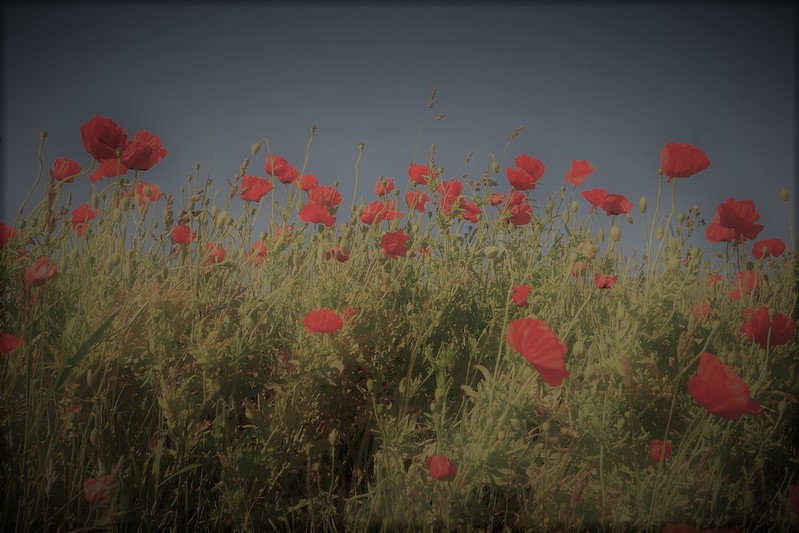The Love Song of Edgar and Amelia
Afternoon again, and Amelia takes her tea on the lawn. She pours the amber liquid into a fine china cup, stares at the grass as it wafts in the breeze, and she lets her mind wander. She feels like she is floating just above the ground, somewhere between being lifted and falling, but it is not unpleasant.
She could drift like this for days, she thinks.
And as this dreaminess washes over her, the tea spills over the rim of her cup and into the saucer, then spreads a stain across the linen tablecloth. Amelia looks at it and notices it resembles a map of Antarctica, but she keeps on pouring. It is only when the tea drips onto her slipper, that she sets the teapot down.
‘Antarctica,’ she says. The word, cool on her lips, like a brush of springtime air. It reminds her of Edgar, though she can’t think why. Did he ever go to Antarctica? She can’t imagine he ever did, but now, as she stares at the tablecloth, she can’t be sure.
Edgar, he is a longing within her. All things remind her of Edgar, even distant and impossible glacial shores.
If he were here, she would have him pour the tea for her – a splash of milk first, then the tea, and lastly, a sugar cube, dropped in with a silver tong – and she would watch him and take comfort in the solemnity with which he performed the task.
‘Edgar,’ she thinks. ‘My dear, meticulous, Edgar.’
But Edgar is not here, and there are so many small ways in which the missing make their absence felt, but she doesn’t want to think about that. And so Amelia sits alone and sips her tea. No milk, no sugar, too cold. She feels a drip trickle from the porcelain and wend its way down her wrist and into the nook of her elbow and she thinks: ‘Where could he be? Surely not Antarctica?’
He vanished some time ago, though when, exactly, she cannot say. All she knows is his disappearance left her with a haunting sense that this was all some strange new beginning. Living needed to be learned anew. Even those small, simple things, such as pouring tea.
But the future, that is also something Amelia prefers not to contemplate, and so she repeats the question. ‘Where are you, Edgar?’ Her voice, faint and unsure, though Edgar hears her all the same. And he wants to explain his new, illuminated awareness to her, but he can’t quite reach her.
And besides, he has no words.
*
Yesterday, was it yesterday? He senses the days have passed, but quite how many he cannot say. So, let us say it was yesterday, he decides. Yesterday, when the sun was high and white in the sky, he was setting down china cups on a silver tray, when a dropped spoon clinked against porcelain, the sound clear as a bell and signalling something.
And when he heard it, he set aside the tray and started to walk, compelled it seemed, to follow the wall the length of the garden. He heard bees humming, caught the heady perfume of lavender, felt the sun, warm on his cheek. And he walked and walked until he came to the door. It was hidden from view behind a curtain of gnarled ivy, and set into the wall like a secret, yet somehow Edgar had always known it was there.
And if, when he reached for the handle, he felt a prickle and tingle beneath his skin; if when he turned it, he caught sight of something fleeting, the memory of someone, or someplace, then he chose to ignore it, because the door, and all that lay beyond, was all that mattered.
And so he pressed his shoulder against its heavy weight and blinked as he crossed the threshold, then walked out of the sun-filled garden to merge into a pale, soothing blue. A voice somewhere— his own he thinks— clear and bright as birdsong, calling to her one last time.
‘Amelia, Amelia.’
Then he was gone.
*
In the garden, Amelia sits and waits, another afternoon with her tea gone cold. She will wait again tomorrow, and the day after. And in this way the days will pass, though she will not count them. She knows there is little to be gained from that.
She will wait and wait, until she hears him calling to her, the sound of her name, as wistful as a forgotten birdsong. ‘Amelia, Amelia,’ the song he sings.
Then she will rise and walk the length of the garden. She will hear the bees buzz in the lavender, catch the scent of the tea roses as she brushes past, and feel the sun warm on her cheek. She will walk and walk until she comes to the door, where she will stand and wait.
The days, the weeks, the years, every moment, falling towards something distant that is drawing ever closer, towards something pale and soothing and blue. An illumination she understands as she tries to call out to him, ‘Edgar’.
But she has no words, and besides, she now has no need for them. Because he is there again, holding open the door.

